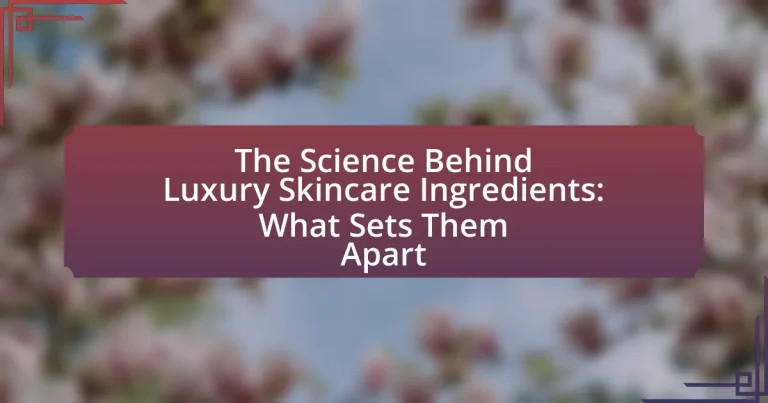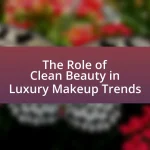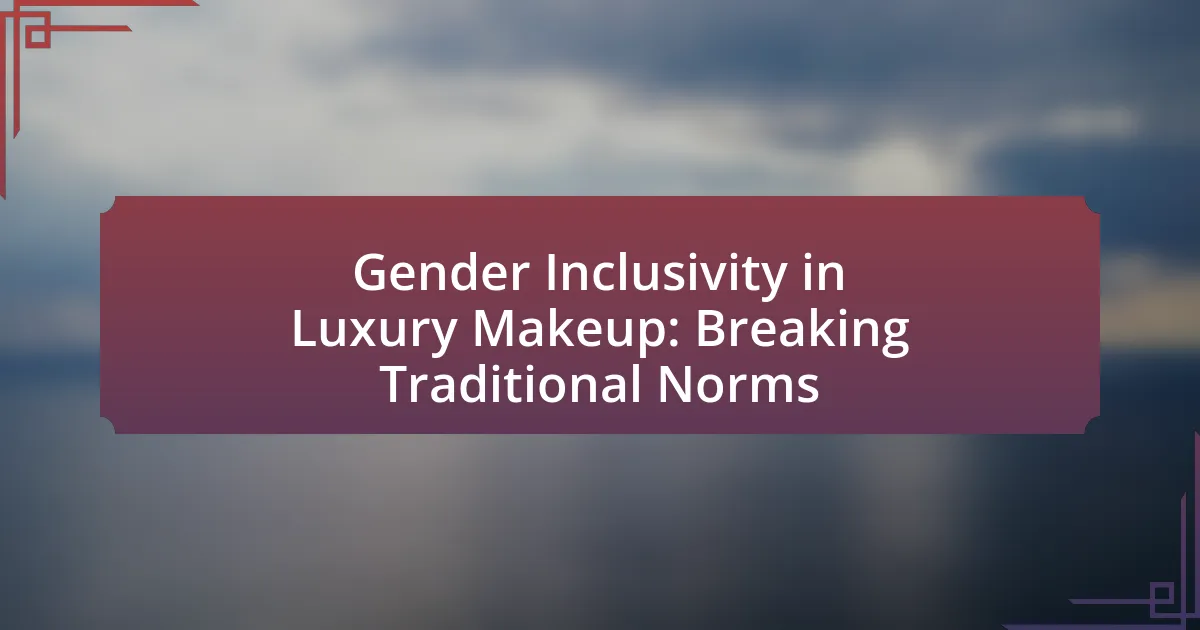Luxury skincare ingredients are high-quality components derived from rare or exotic sources, known for their efficacy in enhancing skin health and appearance. This article explores the distinctions between luxury and regular skincare ingredients, emphasizing their sourcing, formulation, and scientific backing. It delves into the effectiveness of luxury ingredients, their interaction with skin at a cellular level, and the advanced formulation techniques that maximize their benefits. Additionally, the article addresses consumer preferences for luxury skincare, potential downsides, and best practices for usage, providing a comprehensive understanding of what sets luxury skincare ingredients apart in the market.
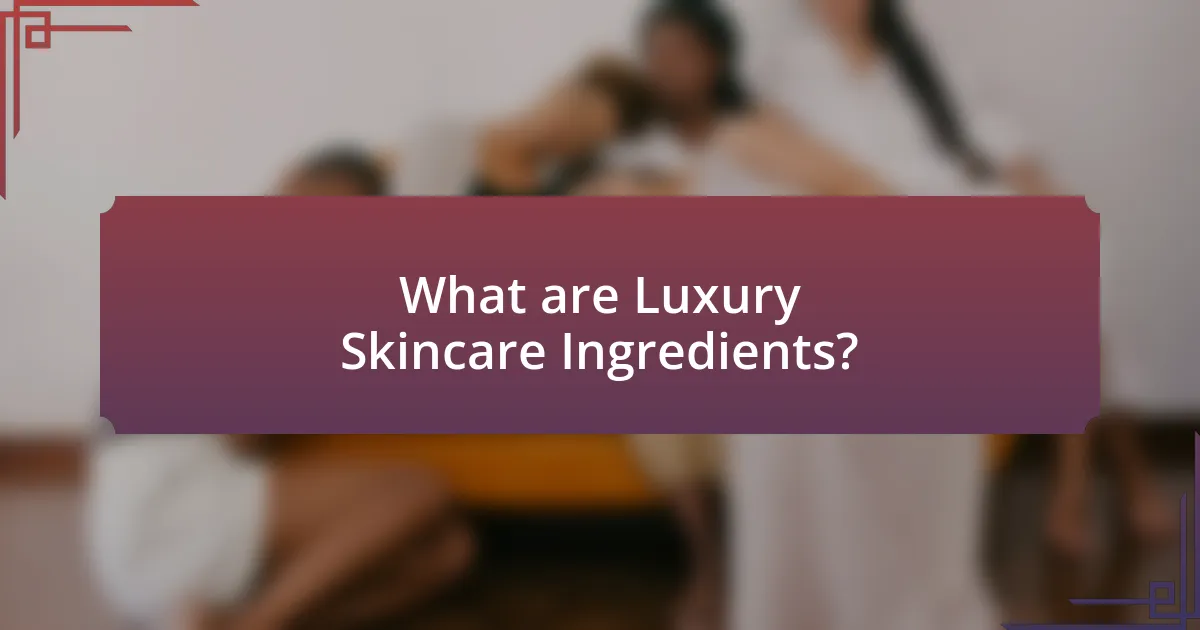
What are Luxury Skincare Ingredients?
Luxury skincare ingredients are high-quality components used in premium skincare products, often derived from rare or exotic sources. These ingredients typically include active compounds such as peptides, antioxidants, and botanical extracts, which are known for their efficacy in improving skin health and appearance. For example, ingredients like hyaluronic acid and retinol are celebrated for their hydrating and anti-aging properties, respectively. The use of luxury ingredients is often supported by scientific research, demonstrating their effectiveness in clinical studies, such as the benefits of vitamin C in brightening skin tone and reducing signs of aging.
How do luxury skincare ingredients differ from regular skincare ingredients?
Luxury skincare ingredients differ from regular skincare ingredients primarily in their sourcing, formulation, and efficacy. Luxury brands often utilize rare, high-quality components such as caviar, gold, or plant extracts that are meticulously harvested and processed, which enhances their potency and effectiveness. For instance, ingredients like hyaluronic acid in luxury products may be derived from bio-fermentation processes that yield a more bioavailable form, compared to synthetic versions found in regular skincare. Additionally, luxury skincare often incorporates advanced technologies and proprietary blends that improve absorption and results, supported by clinical studies demonstrating superior outcomes in skin hydration and rejuvenation.
What defines an ingredient as ‘luxury’ in skincare?
An ingredient is defined as ‘luxury’ in skincare primarily by its sourcing, formulation, and efficacy. Luxury skincare ingredients often come from rare or exotic sources, such as caviar, gold, or specific botanicals that are difficult to harvest, which contributes to their exclusivity. Additionally, these ingredients are typically formulated with advanced technology that enhances their absorption and effectiveness, ensuring superior results compared to standard ingredients. For instance, the use of encapsulation technology in luxury products allows active ingredients to penetrate deeper into the skin, maximizing their benefits. This combination of rarity, advanced formulation, and proven efficacy establishes an ingredient’s status as luxury in the skincare market.
How is the sourcing of luxury ingredients different?
The sourcing of luxury ingredients is characterized by a focus on rarity, quality, and ethical practices. Luxury brands often seek out unique, high-quality materials that are not mass-produced, such as rare botanicals or sustainably harvested marine extracts. For instance, the sourcing of ingredients like caviar or gold is done through controlled methods that ensure both the preservation of the resource and the environment. Additionally, luxury brands frequently emphasize transparency in their supply chains, often partnering with local artisans or communities to ensure fair trade practices, which enhances the overall value and story behind the product. This approach not only elevates the ingredient’s prestige but also aligns with consumer demand for sustainability and ethical sourcing.
Why are luxury skincare ingredients considered effective?
Luxury skincare ingredients are considered effective due to their high concentration of active compounds and superior formulation technologies. These ingredients often include rare botanicals, advanced peptides, and potent antioxidants that have been scientifically validated for their efficacy in improving skin health. For instance, studies have shown that ingredients like hyaluronic acid can retain moisture in the skin, leading to improved hydration and elasticity. Additionally, luxury brands frequently invest in research and development, ensuring that their products utilize cutting-edge delivery systems that enhance absorption and effectiveness, which is supported by clinical trials demonstrating significant improvements in skin texture and appearance.
What scientific research supports the efficacy of luxury ingredients?
Scientific research supporting the efficacy of luxury ingredients includes studies that demonstrate the benefits of specific high-end components like caviar extract, gold, and rare botanicals. For instance, a study published in the Journal of Cosmetic Dermatology by researchers at the University of California found that caviar extract significantly improved skin hydration and elasticity due to its rich nutrient profile, including omega-3 fatty acids and vitamins. Additionally, research from the International Journal of Cosmetic Science indicated that gold nanoparticles can enhance skin absorption and provide anti-inflammatory effects, making them effective in luxury skincare formulations. These studies provide concrete evidence that luxury ingredients can offer unique benefits that differentiate them from standard skincare components.
How do luxury ingredients interact with the skin at a cellular level?
Luxury ingredients interact with the skin at a cellular level by enhancing cellular functions, promoting hydration, and providing antioxidant protection. These ingredients, such as peptides, hyaluronic acid, and botanical extracts, penetrate the skin barrier and stimulate collagen production, which is crucial for maintaining skin elasticity and firmness. For instance, studies have shown that peptides can signal skin cells to produce more collagen, thereby improving skin texture and reducing the appearance of fine lines. Additionally, hyaluronic acid can hold up to 1,000 times its weight in water, effectively hydrating skin cells and promoting a plump appearance. This cellular interaction is supported by research indicating that luxury ingredients can significantly improve skin health and appearance through their biochemical properties.
What role do formulations play in luxury skincare?
Formulations are crucial in luxury skincare as they determine the efficacy, texture, and sensory experience of the products. High-end brands invest in advanced formulations that combine potent active ingredients with innovative delivery systems, enhancing absorption and effectiveness. For instance, luxury skincare often utilizes encapsulation technology, which protects sensitive ingredients and ensures they reach deeper skin layers, thereby maximizing their benefits. This focus on sophisticated formulations not only elevates product performance but also aligns with consumer expectations for quality and results in the luxury market.
How do formulations enhance the benefits of luxury ingredients?
Formulations enhance the benefits of luxury ingredients by optimizing their delivery and efficacy through scientifically designed combinations. These formulations utilize specific ratios, stabilizers, and carriers that ensure the active compounds penetrate the skin effectively, maximizing their potential benefits. For instance, encapsulation techniques can protect sensitive ingredients like antioxidants from degradation, allowing them to remain potent until applied. Additionally, the inclusion of complementary ingredients can create synergistic effects, where the combined action of multiple components leads to enhanced results, such as improved hydration or increased skin elasticity. This approach is supported by research indicating that well-formulated products can significantly improve skin health and appearance compared to unformulated luxury ingredients alone.
What are the common formulation techniques used in luxury skincare?
Common formulation techniques used in luxury skincare include emulsion technology, encapsulation, and advanced delivery systems. Emulsion technology allows for the combination of oil and water phases, creating stable formulations that enhance texture and absorption. Encapsulation techniques, such as liposomes and nanosomes, protect active ingredients and facilitate their targeted release, improving efficacy. Advanced delivery systems, like microemulsions and hydrogels, enhance penetration and bioavailability of ingredients, ensuring that luxury skincare products provide superior results. These techniques are essential for achieving the high performance and sensory experience expected in luxury skincare products.

What are the Key Benefits of Luxury Skincare Ingredients?
Luxury skincare ingredients provide enhanced efficacy, superior hydration, and improved skin texture. These ingredients often include high-quality botanicals, rare extracts, and advanced formulations that deliver potent antioxidants, peptides, and vitamins directly to the skin. For instance, ingredients like hyaluronic acid can hold up to 1,000 times its weight in water, significantly boosting skin moisture levels. Additionally, luxury brands frequently utilize cutting-edge technology in their formulations, such as encapsulation techniques that enhance ingredient stability and absorption. This results in more visible and lasting improvements in skin health and appearance, supported by clinical studies demonstrating the effectiveness of these premium components in reducing signs of aging and promoting overall skin vitality.
How do luxury ingredients contribute to skin health?
Luxury ingredients contribute to skin health by providing high concentrations of beneficial compounds that enhance hydration, promote cellular regeneration, and improve skin barrier function. For instance, ingredients like caviar extract are rich in omega-3 fatty acids and vitamins, which help to nourish and rejuvenate the skin. Additionally, rare botanicals such as rose oil contain antioxidants that protect against environmental stressors, reducing signs of aging. Studies have shown that formulations with luxury ingredients often yield better hydration levels and improved skin texture compared to standard formulations, as evidenced by clinical trials demonstrating significant moisture retention and elasticity improvements in users.
What specific skin concerns can luxury ingredients address?
Luxury ingredients can address specific skin concerns such as aging, dryness, hyperpigmentation, and sensitivity. For instance, ingredients like retinol and peptides are known to reduce the appearance of fine lines and wrinkles, while hyaluronic acid effectively hydrates the skin, improving moisture retention. Additionally, luxury formulations often include antioxidants like vitamin C, which can brighten the skin and reduce hyperpigmentation. Furthermore, botanical extracts such as chamomile and calendula are utilized for their soothing properties, making them effective for sensitive skin. These ingredients are often backed by scientific studies demonstrating their efficacy in improving skin health and appearance.
How do luxury ingredients promote long-term skin benefits?
Luxury ingredients promote long-term skin benefits by providing high concentrations of active compounds that enhance skin health and appearance. These ingredients, such as peptides, antioxidants, and rare botanical extracts, are often formulated to penetrate deeper layers of the skin, facilitating cellular regeneration and improving hydration. For instance, studies have shown that peptides can stimulate collagen production, leading to firmer skin over time. Additionally, antioxidants like vitamin C and E protect against oxidative stress, which can accelerate aging. The use of luxury ingredients often involves advanced extraction and formulation techniques, ensuring that these beneficial compounds remain stable and effective, thereby maximizing their long-term impact on skin health.
Why do consumers choose luxury skincare products?
Consumers choose luxury skincare products primarily for their perceived effectiveness and high-quality ingredients. Luxury skincare brands often utilize advanced formulations and rare, potent ingredients that are scientifically proven to deliver superior results, such as improved hydration, anti-aging benefits, and enhanced skin texture. For instance, a study published in the Journal of Cosmetic Dermatology highlights that products containing peptides and antioxidants, commonly found in luxury lines, can significantly improve skin elasticity and reduce wrinkles. Additionally, the exclusivity and prestige associated with luxury brands contribute to consumer preference, as many individuals associate these products with status and self-care.
What psychological factors influence the purchase of luxury skincare?
The psychological factors influencing the purchase of luxury skincare include self-esteem enhancement, social status signaling, and emotional gratification. Consumers often associate luxury skincare with higher quality and efficacy, which boosts their self-esteem and confidence. Additionally, purchasing luxury products serves as a status symbol, reflecting wealth and sophistication to peers. Emotional gratification arises from the indulgent experience of using high-end products, which can create a sense of pleasure and well-being. Research indicates that consumers are willing to pay a premium for products that fulfill these psychological needs, reinforcing the connection between luxury skincare and personal identity.
How does branding affect consumer perception of luxury skincare?
Branding significantly influences consumer perception of luxury skincare by creating an image of exclusivity and quality. Luxury skincare brands often employ high-end packaging, celebrity endorsements, and targeted marketing strategies to evoke a sense of prestige and desirability. Research indicates that consumers associate strong branding with superior product efficacy and safety, leading to a willingness to pay premium prices. For instance, a study published in the Journal of Consumer Research found that consumers are more likely to perceive products from well-known luxury brands as more effective than identical products from lesser-known brands, even when the ingredients are the same. This demonstrates that branding not only shapes perceptions but also impacts purchasing behavior in the luxury skincare market.
What are the potential downsides of luxury skincare ingredients?
Luxury skincare ingredients can have potential downsides, including high costs, risk of allergic reactions, and lack of scientific validation. The high price tag often does not guarantee efficacy, as some luxury products may contain ingredients that are not proven to be more effective than their less expensive counterparts. Additionally, certain luxury ingredients, such as essential oils or botanical extracts, can trigger skin sensitivities or allergies in some individuals. A study published in the Journal of Dermatology found that up to 10% of the population may experience allergic reactions to common skincare ingredients, highlighting the importance of patch testing before use. Furthermore, the marketing of luxury skincare often emphasizes exclusivity and luxury rather than scientific backing, which can mislead consumers regarding the actual benefits of these products.
Are there any risks associated with using luxury skincare products?
Yes, there are risks associated with using luxury skincare products. These risks can include allergic reactions, skin irritation, and potential toxicity from certain high-concentration ingredients. For instance, some luxury products may contain fragrances or preservatives that can trigger sensitivities in individuals with reactive skin. Additionally, the use of potent active ingredients, such as retinoids or acids, without proper guidance can lead to adverse effects like redness or peeling. A study published in the Journal of Dermatological Treatment highlighted that 30% of participants experienced irritation from high-end skincare products containing such ingredients. Therefore, while luxury skincare products often promise enhanced benefits, they can also pose risks that consumers should be aware of.
How do luxury skincare products compare in terms of cost-effectiveness?
Luxury skincare products often lack cost-effectiveness when compared to their non-luxury counterparts. While luxury brands typically use high-quality ingredients and advanced formulations, the price point can be significantly higher, sometimes exceeding hundreds of dollars for a single product. For instance, a study published in the Journal of Cosmetic Dermatology found that many luxury skincare products do not demonstrate superior efficacy compared to more affordable options, suggesting that consumers may not receive proportional benefits relative to their investment. Additionally, a survey by Statista indicated that consumers often perceive luxury skincare as a status symbol rather than a necessity, further complicating the assessment of cost-effectiveness.
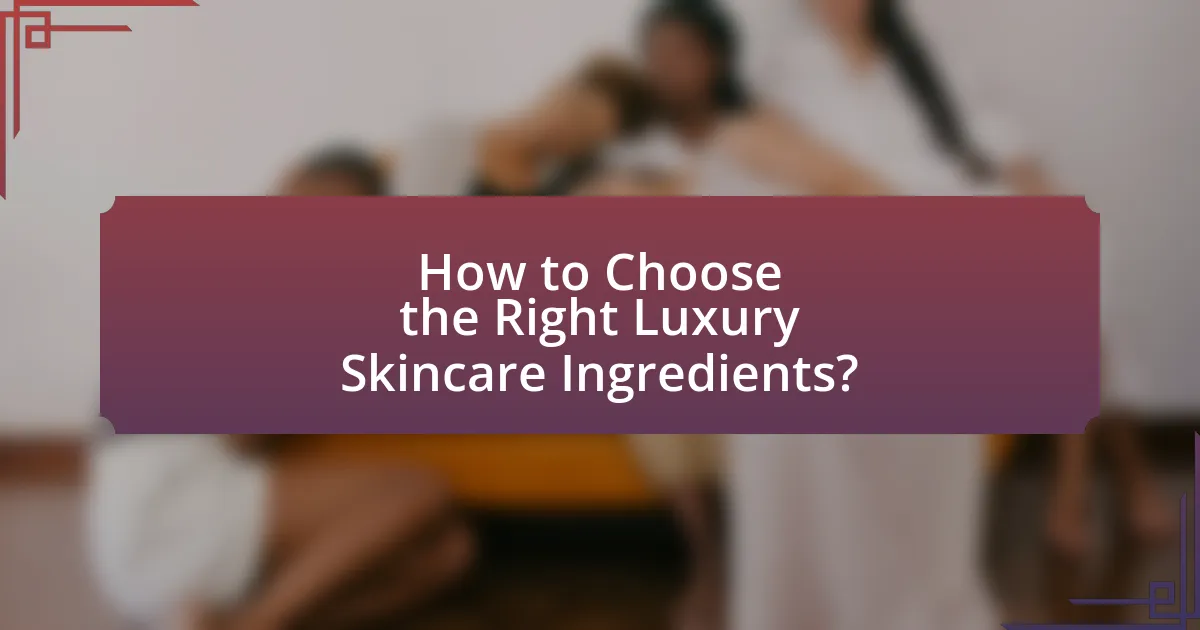
How to Choose the Right Luxury Skincare Ingredients?
To choose the right luxury skincare ingredients, prioritize formulations that contain scientifically-backed active components known for their efficacy, such as hyaluronic acid for hydration, retinol for anti-aging, and antioxidants like vitamin C for skin protection. Research indicates that luxury skincare brands often invest in higher concentrations of these ingredients, enhancing their effectiveness compared to standard products. For instance, a study published in the Journal of Cosmetic Dermatology highlights that formulations with higher concentrations of retinol significantly improve skin texture and reduce fine lines. Therefore, selecting products with proven active ingredients and reputable clinical backing ensures optimal results in luxury skincare.
What should consumers look for in luxury skincare products?
Consumers should look for high-quality, scientifically-backed ingredients in luxury skincare products. These products often feature advanced formulations that include potent active ingredients such as peptides, antioxidants, and botanical extracts, which are known to provide significant skin benefits. For instance, studies have shown that peptides can enhance collagen production, leading to improved skin elasticity and reduced wrinkles. Additionally, luxury brands frequently invest in research and development, ensuring their products undergo rigorous testing for efficacy and safety, which can be validated through clinical trials and dermatological studies. This commitment to quality and innovation distinguishes luxury skincare from standard offerings, making it essential for consumers to prioritize ingredient integrity and proven results when selecting products.
How can ingredient lists guide purchasing decisions?
Ingredient lists guide purchasing decisions by providing consumers with essential information about the components of a product, enabling informed choices. When shoppers analyze ingredient lists, they can identify beneficial ingredients, potential allergens, and harmful additives, which directly influence their purchasing behavior. For instance, a study published in the Journal of Consumer Research found that consumers are more likely to purchase products with recognizable and beneficial ingredients, such as hyaluronic acid or vitamin C, while avoiding those with synthetic additives. This transparency fosters trust and aligns with consumer preferences for natural and effective skincare solutions.
What certifications or standards should luxury skincare products meet?
Luxury skincare products should meet certifications such as the Ecocert, USDA Organic, and ISO 22716 standards. These certifications ensure that the products are formulated with high-quality ingredients, adhere to safety and environmental regulations, and follow good manufacturing practices. For instance, Ecocert verifies organic and natural cosmetics, while USDA Organic certification confirms that products contain at least 95% organic ingredients. ISO 22716 provides guidelines for the production, control, storage, and shipment of cosmetic products, ensuring consistency and safety in luxury skincare formulations.
How can consumers ensure they are getting genuine luxury ingredients?
Consumers can ensure they are getting genuine luxury ingredients by researching brands and verifying their sourcing practices. Authentic luxury skincare brands often provide transparency about ingredient origins, such as using sustainably sourced botanicals or rare minerals. For instance, brands that utilize ingredients like caviar or truffles typically disclose their sourcing methods, which can be verified through third-party certifications or ingredient lists. Additionally, consumers should look for products that have undergone clinical testing or have been validated by dermatologists, as these endorsements often indicate a commitment to quality and authenticity.
What are the signs of counterfeit luxury skincare products?
Signs of counterfeit luxury skincare products include poor packaging quality, misspelled brand names, and inconsistent product texture or color. Authentic luxury skincare brands maintain high standards in packaging, often using high-quality materials and precise printing techniques. Counterfeit products may have flimsy packaging or incorrect logos. Additionally, genuine products have a consistent texture and color, while counterfeit items may vary significantly, indicating a lack of quality control.
How can consumers verify the authenticity of luxury skincare brands?
Consumers can verify the authenticity of luxury skincare brands by checking for official certifications, examining product packaging for unique identifiers, and purchasing from authorized retailers. Official certifications, such as those from dermatological associations or luxury brand certifications, indicate that the product meets specific quality standards. Additionally, authentic luxury skincare products often feature holograms, serial numbers, or QR codes on their packaging that can be verified through the brand’s official website. Purchasing from authorized retailers, whether online or in-store, ensures that the products are genuine, as these retailers have established relationships with the brands.
What are some best practices for using luxury skincare products?
To effectively use luxury skincare products, it is essential to follow a structured routine that maximizes their benefits. Begin by cleansing the skin thoroughly to remove impurities, allowing the active ingredients in luxury products to penetrate effectively. Next, apply products in the correct order, typically starting with lighter formulations like serums before moving to heavier creams, as this enhances absorption. Additionally, use products consistently, as luxury skincare often contains potent ingredients that require time to show results; for instance, ingredients like retinol or peptides may take several weeks to visibly improve skin texture. Finally, always perform a patch test before introducing new products to avoid adverse reactions, especially since luxury formulations can contain high concentrations of active ingredients.
How can consumers maximize the benefits of luxury skincare ingredients?
Consumers can maximize the benefits of luxury skincare ingredients by ensuring proper application techniques and understanding ingredient synergy. Applying products on clean, damp skin enhances absorption, allowing active ingredients to penetrate more effectively. Additionally, combining products with complementary ingredients, such as pairing hyaluronic acid with vitamin C, can amplify their effects, as supported by studies showing that certain combinations improve skin hydration and radiance. Regular use, following a consistent skincare routine, also plays a crucial role in achieving optimal results, as many luxury ingredients require time to show visible improvements.
What common mistakes should be avoided when using luxury skincare products?
Common mistakes to avoid when using luxury skincare products include not patch testing, using products in the wrong order, and expecting immediate results. Not patch testing can lead to adverse reactions, as luxury products often contain potent ingredients. Using products in the wrong order can diminish their effectiveness; for instance, applying a serum before a cleanser can prevent proper absorption. Additionally, expecting immediate results is unrealistic; many luxury skincare products require consistent use over weeks or months to show visible improvements, as supported by dermatological studies indicating that skin cell turnover can take 28 days or longer.
